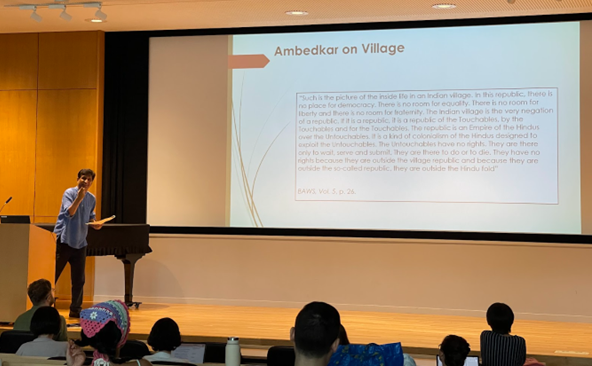 News
News
Sustainable Society Design Center Seminar with Professor Sharma: "Seeing Nature through the Lens of Political Ideology: Caste, Religion and Environmental Justice"
Prof. Mukul Sharma from Ashoka University and affiliated with Tokyo College, the University of Tokyo, gave a seminar titled "Seeing Nature through the Lens of Political Ideology: Caste, Religion and Environmental Justice" on July 17 at Kashiwa Campus.
Prof. Sharma is the author of Dalit Ecologies: Caste and Environment Justice (Cambridge University Press, 2024) and Green and Saffron: The RSS, Modi, and Indian Environmental Politics (Permanent Black, 2024). He spoke about how caste, religion, and political ideology shape environmental politics in India. His talk focused on caste and Dalit ecological relations, climate policy within religious nationalist frameworks, and the fragmented landscape of environmental movements. He stressed that environmental struggles are closely linked to social and political structures and ongoing inequality.
Students and faculty from GPSS engaged in lively discussions, reflecting on the need to contextualise the political and social dimensions of environmental politics.
Lecture Abstract
Environmental politics in contemporary India is characterised by intricate intersections of development, livelihood, caste, religion, capital, and state power, producing competing and often contradictory engagements with nature. This presentation interrogates the role of political ideology and identity - particularly caste and religious affiliation - in shaping environmental discourses and practices. Drawing on three critical domains - the entanglements of caste, Dalit subjectivities, and ecological relations; the development of climate change policy with religious nationalist frameworks; and the current fragmented, plural landscape of environmental movements - I explore the contested terrain of environmental justice in a non-Western context. By foregrounding these intersections, the talk seeks to illuminate how environmental struggles are deeply embedded in broader socio-political structures and to reflect on the challenges of articulating justice in the face of enduring inequality and ideological polarization.



 Japanese
Japanese